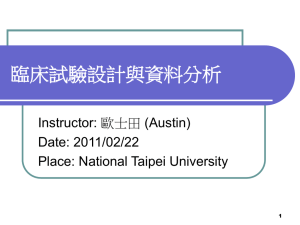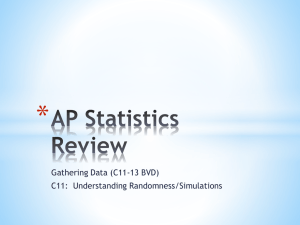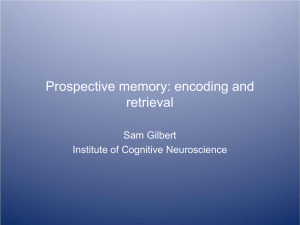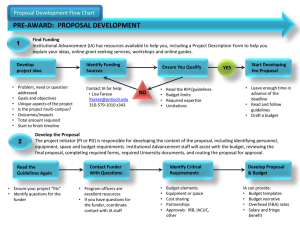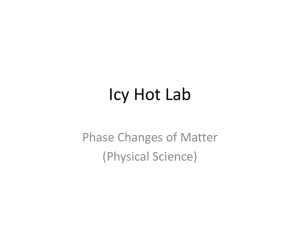Clinical Trials as Instruments supporting Evidence
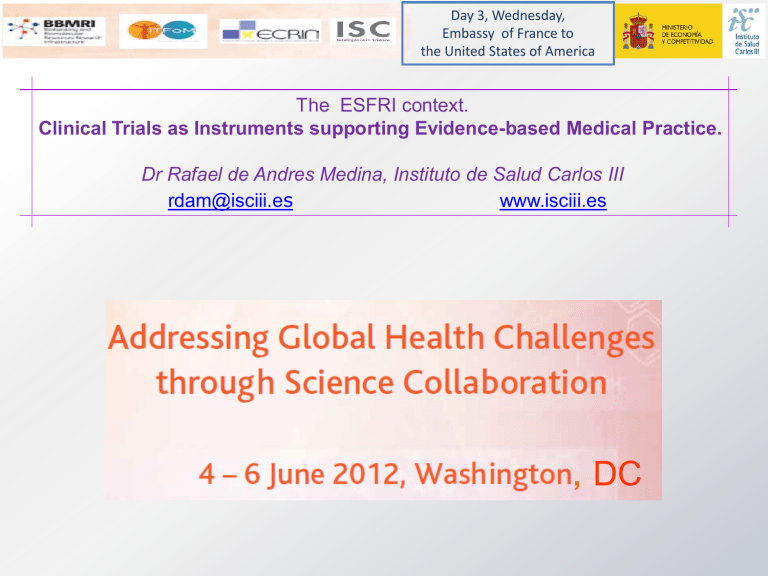
Day 3, Wednesday,
Embassy of France to the United States of America
The ESFRI context.
Clinical Trials as Instruments supporting Evidence-based Medical Practice.
Dr Rafael de Andres Medina, Instituto de Salud Carlos III rdam@isciii.e
s www.isciii.es
, DC
Washington, DC
4 - 6 June 2012
An overview of the context
Clinical Trials
as
Instruments
Supporting Evidence-based
Medical Practice
2
RDAM
2006
2008
Washington, DC
4 - 6 June 2012
Biological and Medical Sciences [BMS]
Research Infrastructures [RI]
Should provide relevant scientific services.
Promote continuous innovation.
Business Plan.
Sustainability ensured by self committed member states.
Predictable Governnance.
Science is scientists ´ driven.
Fair access (no self service).
External advisory Board - helicopter view.
Financing and administration is member state driven.
Used to have each own legal personnality.
If ERIC, awarded by the European Commission, VTA exempt.
ESFRI
- SWGs assess the implementation and performance
3 RDAM
Washington, DC
4 - 6 June 2012
Biological and Medical Sciences [BMS]
Researhc Infrastructures [RI]
2006
BBMRI - Biobanks
Spain: ISCIII as funder with 63 biobanks ´ network as Scientific partners
EATRIS - Translational Research Facilities
Spain: ISCIII as funder and Health Research Institutes ´ network as Scientific partners
ECRIN - Clinical trial platform
Spain: ISCIII as funder with 40 CRO as Scientific partners
ELIXIR - Bioinformatics
Spain: ISCIII as funder with and INB as Scientific partner
INFRAFRONTIER - Mouse Models and Archives
INSTRUCT - Structural Biology Facilities
2008 EMBRC - Marine Biology Resources
ERINHA - High-security labs
Spain: ISCIII as partner
EuroBioImaging - Cellular and Medical Imaging
EU-Openscreen - Chemical Libraries and Screening
2010 ANAEE - Analysis and experimentation on ecosystems
ISBE – Infrastructure for Systems Biology
EMBRC - European Marine Biological Resource Centre
MIRRI – Microbial resources
RDAM 4
Washington, DC
4 - 6 June 2012
Strategic Working Groups
[SWGs]
Health & Food.
Enviromental & Climate Change.
Energy.
Social & Cultural Innovation.
Innovation Technology Transfer.
RegionaI.
Evaluation.
Implementation.
RDAM 5
RDAM
Washington, DC
4 - 6 June 2012
Investment in independent clinical trials brings major added value for European
R&D, health care systems, patients and citizens .
Need for independent clinical trials.
Need for multinational collaboration.
Policy makers ´ s and public understanding and effective support .
6
RDAM
Washington, DC
4 - 6 June 2012
The goal of evidence-based medicine.
It applies not only for medicinal products, but also for medical devices.
Other non-pharmacological interventions, e.g. rehabilitative procedures and surgical techniques, require comparative clinical trials too.
e.g. Relevant in Multi-morbidity / poly-pathology of ageing populations that will require therapeutic combinations.
7
RDAM
Washington, DC
4 - 6 June 2012
Basic sciences, particularly the new –omics methods, are leading to an important change in the nomenclature of diseases .
What was considered a single disease is now dissected into various strata.
• Relevat for distinct diagnostic and prognostic features .
Prevention and predictive medicine.
8
Washington, DC
4 - 6 June 2012
Need for independent clinical trials.
Independent evaluation of health interventions is required to support health authorities, develop health care policies and define clinical guidelines for healthcare professionals.
“is this particular product effective and safe?” .
RDAM
Highly positive return on investment for society.
Decrease in the burden of disease,
Optimized health care strategies,
Cost containment in health care systems.
To get robuster evidence.
9
Washington, DC
4 - 6 June 2012
Need for multinational collaboration.
Rapid assessment of the effects of treatments .
Large and diverse populations.
Wider applicability of study results.
More successful adoption in national health care systems.
Reduce inequalities in health care.
Promotes evidence-based medical practice.
Access to larger patient populations and to clinical expertise.
To study of stratified and personnalised treatment strategies.
To study on rare diseases / conditions.
Access to best appropriate medical centres.
Room for more regulatory collaboration too.
RDAM
10
RDAM
Washington, DC
4 - 6 June 2012
We need a common vision and a shared will.
Many thanks for your attention !!!
11



